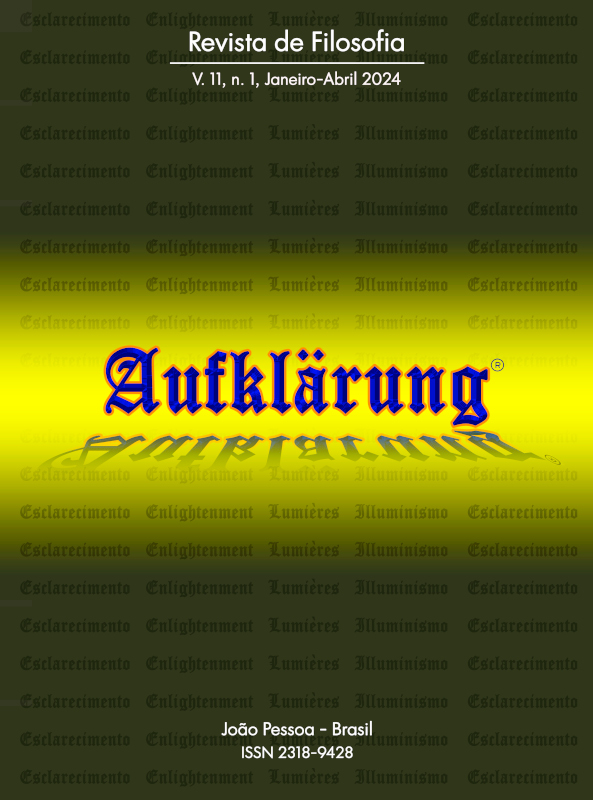Walter Benjamin reads the Symposium: Plato against the myth
DOI:
https://doi.org/10.18012/arf.v11i1.67595Keywords:
Walter Benjamin, Plato, Myth, Truth, BeautyAbstract
Even if it has not been so thoroughly investigated, the importance of Platonic philosophy in Benjamin’s work can hardly be argued. Numerous texts, notes and letters reveal the presence of Plato in Benjamin’s thought. But it is specially The origin of German Trauerspiel the place where Benjamin takes Plato’s philosophy most explicitly and extensively. In the “Epistemocritical Preface” –where he develops his theory of knowledge through a revindication and reinterpretation of the Platonic “doctrine of ideas”– as well as in other sections of the book, Plato appears as a fundamental source. In this context, a dialogue stands out: the Symposium. This article aims at investigating Benjamin’s reading of that dialogue, a reading which articulates the figure of a Plato that develops his philosophy as a way to oppose myth, and that allows to elevate philosophy again as a form for the exposition of truth in language.
Downloads
References
BENJAMIN, W.; Gesammelte Schriften. 7 vols. Ed. por R. Tiedemann y H. Schweppenhäuser. Fráncfort del Meno: Suhrkamp, 1972-1989.
BENJAMIN, W.; Briefe. 2 vols. Ed. por T. Adorno y G. Scholem. Fráncfort del Meno: Suhrkamp, 1966.
BENJAMIN, W.; Obras I/1. Madrid: Abada, 2007.
BENJAMIN, W.; Obras II/1. Madrid: Abada, 2007.
BENJAMIN, W.; Obras VI. Madrid: Abada, 2017.
DIXSAUT, M.; Métamorphoses de la dialectique dans les dialogues de Platon. París: Vrin, 2001.
DIXSAUT, M.; Platon. París: Vrin, 2012.
GADAMER, H-G.; Dialogue and dialectic. Eight hermeneutical studies on Plato. New Haven/Londres : Yale University press, 1980.
HÖLDERLIN, F.; “Notas sobre Edipo”. Ensayos. Madrid: Hiperión, 2008 [1804].
IBARLUCÍA, R. “Sócrates, el presocrático. Walter Benjamin, la mitología y su lectura del Simposio en 1916”. Eadem Utraque Europa, año 1, núm. 1, Buenos Aires, 2005.
KAHN, C.; Plato and the Socratic dialogue. The philosophical use of a literary form. Cambridge University press, 1997.
MENNINGHAUS, W.; Saber de los umbrales. Walter Benjamin y el pasaje del mito. Buenos Aires: Biblos, 2013.
NIETZSCHE, F.; Obras completas III. Madrid: Tecnos, 2014.
PLATÓN; Fedro. Traducción de Santa Cruz M. I. y Crespo I. Buenos Aires: Losada, 2007.
PLATÓN; Filebo. Traducción de Durán, M. A. In: Diálogos VI. Madrid: Gredos, 2015.
PLATÓN; República. Traducción de Eggers Lan, C. In: Diálogos IV. Madrid: Gredos, 2000.
PLATÓN; Banquete. Traducción de Martínez Herrnández, M. In: Diálogos III. Madrid: Gredos, 1988.
RACKET, A. “El éros anti-trágico del Banquete de Platón”. In: Castello, L. y Mársico, C. (eds.). El lenguaje como problema entre los griegos. ¿Cómo decir lo real?. Buenos Aires: Altamira, 2005.
SOARES, L. “El Aristófanes trágico de Platón”. In: Bieda, E. y Mársico, C. T. (eds.), Ética, política y estética en la Grecia clásica. Ensayos en homenaje a Victoria E. Juliá. Buenos Aires: Biblos, 2019, pp. 183-204.
Additional Files
Published
How to Cite
Issue
Section
License

This work is licensed under a Creative Commons Attribution 4.0 International License.
Journal general policy
1.This journal works under a Creative Commons License aplied to online journals. That icence can be read in the following link: Creative Commons Attribution 4.0 International (CC BY 4.0).
2.Accordingly to this License, a)the journal declares that authors hold the copyright of their articles without restrictions, and they can archieve them as post-print elsewhere. b)the journal allow the author(s) to retain publishing rights without restrictions.
Metadata Policy for information describing items in the repository
1. Anyone may access the metadata free of charge at anytime.
2.The metadata may be re-used in any medium without prior permission, even commercial purposes provided the OAI Identifier or a link to the original metadata record are given, under the terms of a CC BY license refered for the Journal.







































